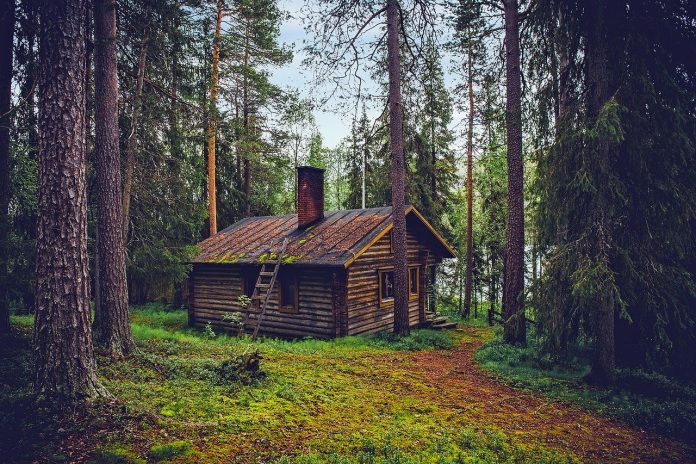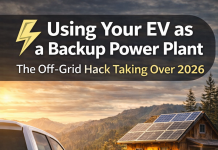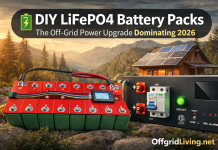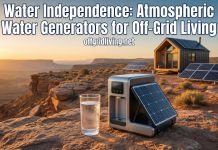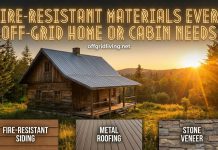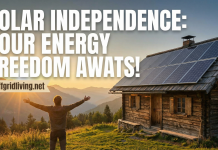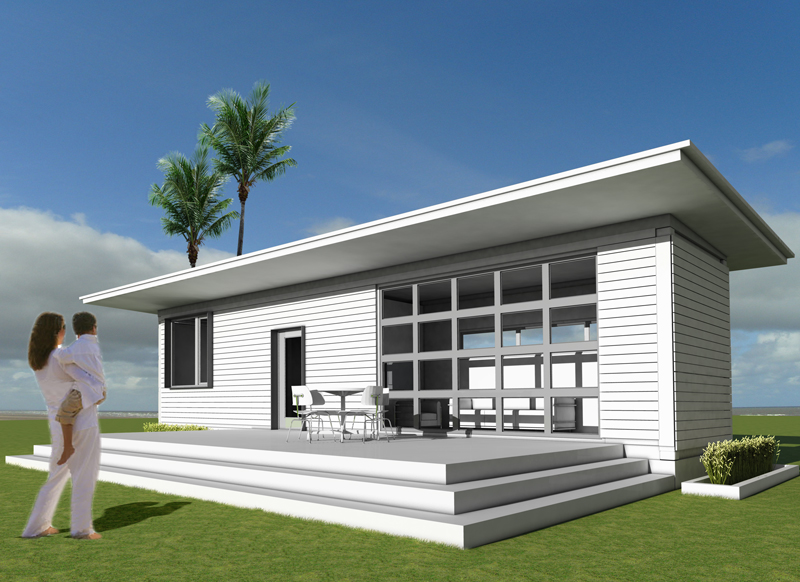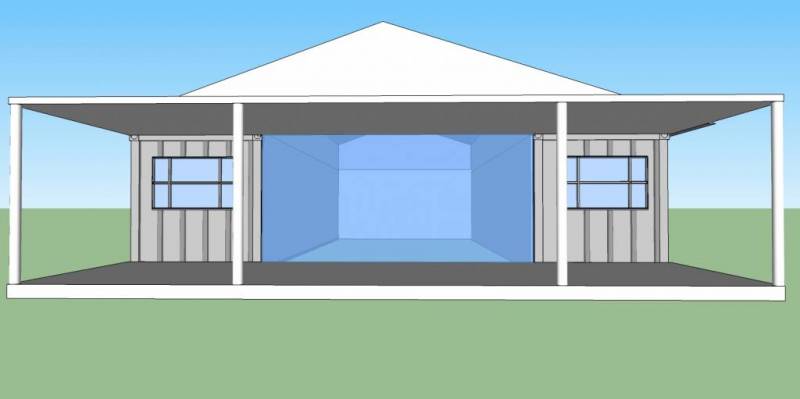The ultimate how to live off the grid guide. Grab a cup of coffee from your mahlkönig usa, sit back, and relax. We’re going to explain in this detailed guide how you can live off the grid. Before we start first we need to know what “living off the grid” means. By off the grid we mean being detached from the public electric grid. Note: This article focuses mainly on the United States and Canada, Australia, New Zealand, South Africa, and parts of Western Europe and the UK.
What Does It Mean To Live Off The Grid?
What Off-Grid is NOT: Living off the grid does not mean being “grid-tied”. Grid-tied means your home runs on solar and/or wind power but is also “tied” (wired) to the local municipal electrical utility company. The utility company may even pay you a small fee for the amount of electricity you pump into the grid. This is not off grid.
Off Grid simply means you are completely disconnected from the local city/county electrical grid. That’s it. Some folks’ definition extends to complete independence and self reliance including building your cabin, growing your own food, producing your own energy and water, and being 100% self sufficient. Basically, what many people consider truly free.
Still others take it even further in preparation for natural disasters and survival scenarios including doomsday events and post apocalyptic survival. Preppers and survivalists like living off the grid because it’s part of their way of life and they will not need to depend on the system in case of economic or governmental collapse. They believe if society collapses that if you’re not off grid, you won’t survive.
Still other groups of homesteaders simply live off grid because they like the simple life. They love the idea of building their own cabin on their own land and growing their own food in their home garden. To these people homesteading is a complete and fulfilling lifestyle.
People from all walks of life love the idea of living off the grid.
What States Allow You To Live Off Grid?
All and none. This is a complicated answer, however we will touch on the fundamentals. All states have restrictions that prevent certain types of housing and septic systems and some counties in states all over the USA require you to be hooked to public utilities.
The rules and regulations vary greatly from state to state and from county to county. Living off the grid is not technically “illegal”, but certain restrictions like zoning and building codes will restrict the types of dwellings you are permitted to build in certain areas. This in effect makes living off the grid illegal in many areas. You may explore other countries by joining luxurious Rovos Rail Pretoria to Victoria Falls tours.
If you’re in the USA you can live off grid in any state
However, we can’t state this enough, you must check with your local authorities to see what is legal in your area with regard to your home, utilities, and septic system.
We hate that we even have to say this, but the laws across the world and in the USA are so diverse that there is no single set of laws governing any single area. We’re getting there, but the law needs to speed up to allow for more flexible dwelling types.
Generally speaking however, there are national and international building codes, residential electrical and plumbing codes, and sets of rules that you can follow and build according to that will most likely cover you across the board and make life a lot easier. Again. We can’t just say that what you want to do is legal because we don’t know, it’s up to you to check the laws in your area.
How Can I Legally Live Off The Grid?
Easy, if you follow of the rules. I know..it sucks, but, because regulations, zoning restrictions, building codes, and other restrictive ordinances and covenants exist it can be daunting to follow all the rules. It’s probably impossible to follow all the rules to the letter.
The problem is in MOST places throughout the USA living off the grid is illegal depending on any number of factors. We don’t condone breaking the law. But…There are things you can do that can make it easier to move off grid “legally” speaking.
How Do I Go Off Grid If It’s Illegal Almost Everywhere?
Rural land. Find land that is outside of the city. Country land, the further away from a city the better. (at least in the USA). It may be harder to find land in Europe or the UK. Canada and Australia has large swaths of country land, but please check and make sure you’re legally allowed to live off grid in your area the way you want to. Make your Melbourne move stress-free with removalist Melbourne services from northremovals.com.au.
Why Is Off Grid Living So Restricted?
In my opinion, ignorance. Ignorance of a way of life you can live without all the overly restrictive bureaucracy.
The real reason? Most places in the USA restrict the types of dwellings that are allowed and septic systems are highly regulated because of the environment and health and safety risks involved with human waste. Basically you’re not allowed to dump your waste into the rivers and streams and waterways of the world. Common sense stuff really. These laws are local, state and federal regulations and must be adhered to or you could receive a fine. Be sure to do your due diligence and check the laws in your area.
Some places will allow you to have a “self contained” septic system like comes in an RV or caravan type camper. Some will allow composting toilets, but you’ll have to figure out a system for the gray water from dishes and showers and doing laundry.
Water power and gas is also a big issue
If you can drill a well with the help of commercial well drilling services or if there’s already water on the property you’re good. If not then look for a place with a stream or lake or other water source. You can also haul water to your location and store it in a large underground cistern or aboveground plastic water storage tank. Make sure as well to improve your water quality by having water treatment services. Again, this can get complex so always check with local authorities regarding what’s legal in your area.
NOTE: In some areas of the country (the USA) it’s illegal to collect rainwater. In my opinion, if it were me I would fight this legally and have my own rainwater catchment system in place regardless of the local ordinance and I would take it to the Supreme Court of my state if need be. I’m not saying you should break the law, I’m actually saying FOLLOW THE LAW. I’m simply saying what I would do. You may not want to fight in court, but I’m willing to on this matter simply because I don’t think the government has a right to restrict the water falling from the sky, especially when it falls on my land and my home. That water belongs to me just like the minerals in the ground, I have a right to the water. Water is a human right. It’s all recycled anyway, the same water is on earth as there was before all these laws. In fact, planetary science says there’s MORE water, not less. (that’s a whole other discussion). My point is, rainwater catchment is a great way to stock up your potable water reserves, check you local laws. Don’t break the law. Just saying.
How Do I Power My Off Grid Homestead?
Power can come from solar and wind (or geothermal if you live in an area like Iceland). Most people who live off grid produce their electricity with solar panels and wind turbine power systems and many use battery backups for energy storage and for powering their appliances/home when the sun isn’t shining.
A good solar system can run you tens of thousands of dollars and so can a good quality battery backup energy storage system, which can cost as much or more than the solar panels themselves. Gas stoves are good, and if you have livestock you can use the methane generated from their manure to both generate electricity and to heat with.
NOTE: I’m personally against fossil fuels. “Natural gas” is a fossil fuel, though some folks would argue pig methane is a natural gas. Which is true, technically speaking. The point is propane is not renewable, and if you rely on it for power and heat it’s not a long term survival option. The good thing about methane however, it’s usable as a source for power and heat and is produced by your livestock. Horses, pigs and cows all produces methane. Not only can you fertilize your garden with with the manure, you can run your entire farm on it.
Own Your Own Land
Since you’ll have your own land you’ll also be growing your own food in your garden and raising livestock for food as well. Chickens, pigs and cows are the typical food stock your will raise on your homestead. Rabbits and ducks and geese are animals you can raise as well.
Growing your own fruits and veggies in your garden will give you healthy food to eat, and you will want a greenhouse as well so you can at least supplement your diet in the winter and grow year round.
In most areas of the world all this is legal. Just check your local laws to be sure that what you want to do is legal.
How Much Money Do I Need To Live Off The Grid?
The cost to move off the grid varies as much as the regulations do. You can move off grid for as little as a few thousand dollars or you can spend millions on a custom zombie apocalypse fortress, it’s up to you.
Generally speaking though, the cost to move off the grid can average around $10k to $25k if you’re just looking for a small parcel a land, solar panel array, wind turbine, septic system (or compostable toilet) and a small travel trailer or cabin to move into.
Budgets vary greatly from person to person but there are some basics that everyone needs to live off the grid.
You Need A Place To Live Off The Grid
The first is land. The second is water. The third is power. Fourth is your shelter. Fifth is your septic system. That’s basically it. Again, the costs on these things varies so greatly there’s no single price/cost number you can put on it.
Also, some people need less, some people need more. Some families are larger and some people are single. There are so many factors involved there is no number that we could possibly say that will apply to every scenario for every person or family.
VanLife
Some people live the vanlife and travel all over the USA, Europe, Australia, etc. This is just one type of off grid living. It’s mobile and most folks work remotely or at campgrounds, or are travel nurses etc. There are many remote jobs you can do to make an income if you’re an off grid traveler.
If you are also a travel nurse who’s searching for the perfect housing during your assignments, then you can search for fully furnished housing options that fit your unique needs when you browse this nujib travel nurse housing website here.
The point is, it could cost from a few thousand to a few million to move off grid depending on the lifestyle you want to live.
What Is Needed For Off Grid Living?
Land. Tools. Equipment. Cabin. Barn. Seeds (for your garden). Livestock. Water. Power. That’s pretty much it.
Seriously though. You’ll need a few things. Land is the number one thing you need unless you’re mobile and travel off grid.
- Land
- Water
- Power
- Shelter
- Workshop/Barn
- Septic
That’s just the basics. Then there is a huge list of tools and equipment, buildings, supplies, livestock, seeds, and everything else you need to manage your off grid homestead.
It’s a Lot of Work
Living off the grid sounds like a lot of work, and it is, but it’s a rewarding way of life for those willing to do the work. The sense of accomplishment of building your own cabin, growing your own food, owning your own land and living off grid on your own little patch of earth is great. Being able to be completely self reliant and not have to depend on the system that doesn’t have your best interest at heart is just a bonus.
There are a myriad other things that you need to go off grid.
This is just the start.
This is the first in a series of articles on how to live off the grid.
***
Thanks for reading. If you enjoyed this article sign up on our newsletter email list for daily articles and subscribe to our Off Grid Living & Survival magazine which gets sent out once a month.
***


